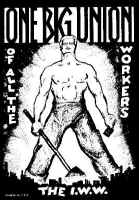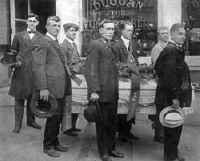|
|
The lynching of Little
|
|
|
"Oh the 'bull' he went
wild over me
And he held his gun where everyone could see
He was breathing rather hard when he saw my union card
He went wild, simply wild over me"
T-Bone Slim

|
| Reporting on
the strike, the Company-controlled press reported that there were no
worker grievances and that pro-German influence had caused the strike.
The Industrial Workers of the World (I.W.W), which was labeled antiwar,
socialistic, and pro-German, provided a convenient scapegoat. |
|
 |
On July 18, 1917, Frank Little, an organizer for the
I.W.W., arrived in Butte. “The Wobblies” had set its sights
on bringing Butte’s miners into the “One Big
Union.” The radical ideas of the I.W.W, including the belief that
workers should take control of the means of production, naturally made
the Company very nervous. The I.W.W embraced less-restrictive membership
policies than other unions and was one of the few unions that had
accepted Irish immigrant workers to its membership. I believe that Henry
J. and some of his compatriots were in fact members of the now infamous
“Wobblies”. Butte erupted into a battlefield with
non-union members pitted against union members and unions fighting each
other. Labor strikes were commonplace. The “Gibraltar of Unionism”
was in fractured pieces. Little’s
arrival served to fan the flames of discontent.
|
| The
“Draft” was introduced that summer, and proved unpopular in Butte for a variety of reasons. German, Serb,
Croat, and Italian immigrants were reluctant to return to Europe
to fight against their own. Many Irish immigrants, most likely including
Henry J. and his friends from Kilkeel, loathed the idea of dying to
defend the British. This all added to the antagonism that already
existed towards the Irish miners. |
| Against this troubled
backdrop, Frank Little gave public speeches telling the miners that the
war was a conflict that should be left to the capitalists who started it
to finish. Workers, he argued, had more in common with each other,
regardless of their nationality. The I.W.W opposed United States participation in the conflict and was vocal in
their argument. Speaking before large crowds of miners, Little
referred to President Woodrow Wilson a “lying tyrant”
and denounced US soldiers as “scabs in
uniform.” This proved to be free speech at its most costly! These were not tolerant times in Montana and Little had picked the wrong time and place to incite
dissent and to encourage what the Company-backed newspapers called
“acts
of sedition”. In the middle of the night on August 1, 1917
, just two weeks after his arrival in Butte, six men arrived at Little’s
boarding house. They identified themselves as officers, abducted Little from
his room. Henry J. recounted the horrific tale to his son Malachy how Little
was savagely beaten, dragged behind a car with a rope, and then hanged from
a railroad trestle on city’s edge. |
|
 |
|
A
note: "Others take notice ….. first and last warning 3-7-77 "
was pinned to Frank Little's chest. It was an old Montana vigilante warning.
3-7-77 were the required measurements for a gravesite. No serious attempt
was ever made by the police to catch his murderers. Although Burton K.
Wheeler, then a federal attorney, condemned the affair as
“a damnable outrage,” no one was ever
prosecuted for the lynching of Frank Little. That didn't mean that the
perpetrators were unknown. Although never proven, many believe that
the key suspects were agents of the "Company". The theory being that
by inciting the striking miners to riot, Company agents could literally
shoot rioting miners and drive them back to work. |
The Helena
Independent reported the event.
"Good work! Let them continue to hang every I.W.W. in
the state. The time has come. It is beyond the comprehension of the
average citizen why the war department has not ordered certain leaders
arrested and shot. The people will not stand for much more." |
The lynching
of Frank Little was in the context of extensive, protracted, and brutal
repression levied against the “Wobblies” by Company gunmen, state
and local vigilantes, and increasingly by the Federal Government. Perhaps Henry J. joined the crowd of
several thousand mourners that turned Little’s funeral procession into an antiwar protest. Not
all Miners subscribed to Little's radical message, but all were uniformly
outraged at the way the messenger was so brutally silenced.
|

Frank Little being carried to his burial. |
|
Infuriated by Little's murder, the
miners rallied to press their strike against the Company. The
authorities responded by employing federal troops
to occupy Butte and drive the I.W.W. from
the mines. Soon, federal and state laws were cracking down on all
activities deemed detrimental to the nation's war effort. Strikes and
anti-war speeches were specifically targeted. After Little's
murder, virtually everyone who ever knew him scurried for cover as
America's most shameful repression of a labor organization began. Any
connection with Frank Little was worth a beating, a prison sentence, or
deportation. If times had been bad for Henry J., they had just got
worst! |
|
| |
|
              |
|
 |
|
